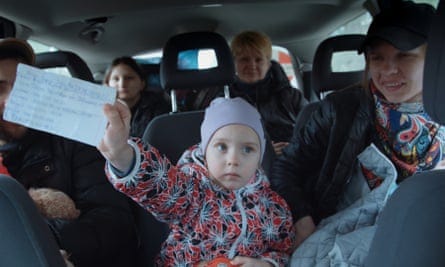Jun 1: ‘They wanted their accounts to be heard’: the film-maker who drove 400 Ukrainians to safety
‘They wanted their accounts to be heard’: the film-maker who drove 400 Ukrainians to safety
By Xan Brooks, The Guardian, May 26, 2023
As In the Rearview premieres at Cannes, its director explains how he made a movie about transporting people across the border in his VW and why he’s rejected the red carpet for a borrowed rug from a bombed home
In the opening month of Russia’s attack on Ukraine, a quarter of the population sought sanctuary elsewhere. Aid organisations estimate that as many as five million people abandoned their homes and fled west for the border. At least 400 went in Maciek Hamela’s van.
Hamela is a 40-year-old documentary film-maker from Warsaw. The van was a Volkswagen Caravelle, rented from a local Vietnamese family who wanted to help out. In February and March last year, Hamela and his friend, cameraman Piotr Grawender, made dozens of return trips to Ukraine, liaising with volunteer groups and ferrying the evacuees into Poland. They told him their stories; he put them on film.
In the Rearview, which screens in the Acid sidebar at the Cannes film festival, is a gripping social document, a no-frills portrait of human migration that confines the bulk of the action to the back of the van. It shows us the people and eavesdrops on their chatter. We hear from the elderly farmer’s wife who’s pining for her favourite cow and the middle-aged woman who carries a photo of her grandfather holding a butterfly. “I come from an aristocratic family,” she says sadly. “Now I am just a travelling frog.”
Hamela says his principal aim was to get his passengers out safely. The idea for the film only came later and needed to be handled with care. People were made aware of the camera when boarding the vehicle, but weren’t handed consent forms until they’d arrived in Poland. It was crucial, he explains, to never give the impression that appearing in the film was somehow a condition of passage.

Only one woman said no. Everyone else signed the form. “They were happy to share their testimonies with the world. Because they had no idea what people outside Ukraine and Russia were thinking. That was their first motivation – they wanted their accounts to be heard. But there was a second motivation that I didn’t expect at the beginning, and it was that people wanted to give back to me personally. I had brought them out and they didn’t know how to pay me back.”
Hamela’s initial intention was to fold his missions in with a wider documentary on the war. But he was inspired by Abbas Kiarostami’s Ten, the tale of a taxi-driver’s trips through Tehran, and decided to keep the focus as tight as possible – to let the people tell the story and use the van’s interior as a kind of travelling theatre, or a confession box.
The route leads through deserted towns, past charred tanks and derelict petrol stations. Several bridges have been bombed; the van is constantly having to find alternative paths to the west. Along the way we encounter Gloria, a Congolese businesswoman who has been shot in the stomach and leg and requires emergency care. We are introduced to five-year-old Sofika, who clutches a folded piece of paper that bears her parents’ names and numbers. The van crosses the Dnieper River; the children mistake it for the sea. They say: “This summer we’ll come back here and jump in the water.”
Some of the passengers are obviously traumatised. Others get by on a diet of gallows humour. One woman recounts the tale of a terrified teenage refugee who was stopped at a checkpoint and forced to join the Russian army. The kid was shaking so hard he could barely put the uniform on. “It may sound funny now,” she says, “but we were crying then.”
Hamela remains deeply involved in the evacuation effort and plans to tour the film to raise funds. This week, though, he’s in Cannes, amid the stars and the yachts and the luxury beachfront hotels. That comes with the territory; it’s the classic festival paradox. Cannes provides a big stage to rail against social injustice and human rights violations. But the stage is erected in a sunny oligarchs’ playground.
I suggest that this must feel like an awkward bargain. “Yes,” he says. “But listen, a good bargain always depends on negotiation. And you negotiate well if you have certain lines you won’t cross. So I’m definitely not going to step aboard any yacht. And I’m not going to step on the red carpet either.” Instead, he has brought his own, salvaged from a ruined house in Ukraine and itself slightly tattered. The owner, he adds, eventually wants it back.
What became of the passengers once they climbed out of the van? Most he’s kept tabs on; a few have disappeared. Hamela tells me that Gloria, the injured Congolese businesswoman, is currently recovering in Berlin. She has undergone 18 operations and still has three to go. Sofika, the girl with the folded sheet of paper, lives with her family in a Warsaw refugee centre. As for Larisa, the one-time aristocrat, she flew to Spain to make a fresh start, only to decide she didn’t like it there after all. She’s now based in France and took the train to see him. “The travelling frog,” says Hamela. “She’s here with me in Cannes.”



